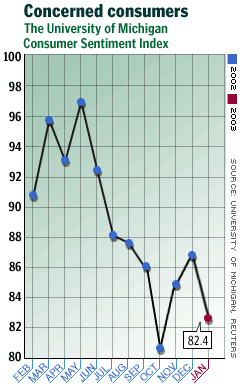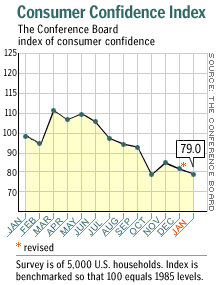NEW YORK (CNN/Money) -
North Korea's got a missile that might reach California, Osama bin Laden is still alive, war in Iraq is closer than ever -- and U.S. consumers are still shopping.
They're buying duct tape, gas masks and high-priced gasoline, of course, but, darn it, at least they're spending. The question is, how much longer can that continue, when every day seems to bring more worries?

Thursday's report on January retail sales was yet another sign that there's very little the world can throw at U.S. consumers to keep them from spending money. Total retail sales fell, but that was mostly because a big jump in demand for automobiles in December fell back to earth. Otherwise, sales were stronger than expected.
"American consumers are holding up not only the U.S. but the global economy as well. They are keeping the world's economic engine moving forward," said Bill Cheney, chief economist at John Hancock Financial Services Inc.
Despite the 2001 recession, nearly 2 million job cuts, the Sept. 11 terrorist attacks, last year's accounting scandals, a three-year bear market, the long buildup to a probable war in Iraq -- are we forgetting anything? -- consumers have kept spending.
It's a good thing, too, since consumer spending is by far the biggest Clydesdale pulling the economic wagon, fueling two-thirds of gross domestic product (GDP), the broadest measure of the world's biggest economy.
But with a heightened national state of alert for terrorism, developments daily regarding North Korea and Iraq, and falling stock prices, consumer spending seems almost certain to suffer this month -- except for sales of duct tape and plastic sheeting, which apparently have some magical power to thwart chemical, biological and radiological weapons.
"It's an unmitigated negative for the economy -- but hopefully it's temporary," said Sherry Cooper, chief economist at BMO Nesbitt Burns.
Retail sales at chain stores were sluggish in early February even before all the latest news, according to the most recent reports by retail trackers Bank of Tokyo-Mitsubishi, UBS Warburg and Instinet Research.

The consensus expectation of economists is that, once the situation in Iraq is resolved and the terror alert is pulled back to yellow, businesses will go back to spending and hiring, which will boost consumer confidence and give a boost to economic growth.
But a small group of economists say businesses have been cautious because they're still trying to work off excess capacity from the late-1990s investment bubble.
Tumbling stock prices have crippled corporate balance sheets, forcing businesses to cut costs -- and jobs. And an awful lot of the new technology and production equipment bought in the good old days is sitting around doing nothing, giving businesses little incentive to go out and buy more.
Consumers have some post-bubble problems of their own. Personal bankruptcy filings set a record in the third quarter of 2002, the latest data available, according to the American Bankruptcy Institute. And after hitting a record early last year, mortgage delinquencies have flattened out, but that might be because banks have tightened their lending standards.
Meanwhile, though consumers have been spending, they've also been socking more away in savings. Personal savings rose in the fourth quarter rose to the highest level in nearly eight years while saving as a percentage of disposable income rose to 4.3 percent, the highest rate in four years.
| Related stories
|

|
|
|
|
"Even without the latest scare, households are retrenching and will continue to do so, especially in the first half," said Paul Kasriel, economist at Northern Trust Co.
In one possible sign of flagging consumer demand, the Mortgage Bankers Association of America said that applications for mortgages fell last week to their lowest level since March 2002 -- despite the fact that average 30-year mortgage rates fell to a record low. And total consumer debt grew just 3.3 percent in 2002, the Federal Reserve reported last week, the slowest growth since 1992.
Meanwhile, measures of consumer confidence are low and getting lower. The Conference Board's monthly confidence index fell in January, and the University of Michigan's sentiment index is expected to fall in February. Michigan releases the report on Friday, and economists, on average, think the reading fell to 81.9 from 82.4 in January, according to Briefing.com.
Of course, consumers don't always spend the way they feel, and they almost never stop spending altogether -- the last time spending actually contracted was the fourth quarter of 1991, when the "jobless" recovery after the 1990-91 recession was in full swing.
But if things turn out to be worse than most economists think, if weakness persists and the labor market continues to suffer, if Iraq or other "geopolitical uncertainties" hurt confidence further, then a drop in spending may actually come to pass.
"You want the consumer buoyant," said Conference Board economist Delos Smith. "Most consumers are not current-events oriented. When you get everybody involved in current events, when they usually are not, then people are not going to go out and buy things just for pleasure of it."

|

